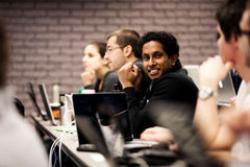
Queen's University is committed to providing an educational experience that will build upon the principles of fairness and inclusiveness - the hallmarks of education equity.
Developing a Culture of Educational Equity
- A broad definition of educational equity encompasses all learning, both formal and informal in the educational setting. Formal learning happens through institutional content and methodology and through official policies governing admissions, evaluations, standards, and accreditation. Informal learning occurs through social interaction with peers, faculty, administration and staff in ways that are often unwritten, subconscious and unintended.
- Educational equity does not evolve in a vacuum. The external environment from which students are drawn, the community that they will eventually serve, and the internal environment of the institution should all form part of the critical analysis used in developing a climate of educational equity.
- Administrative and academic procedures affect educational equity. The means of access, admission and retention of a wide diversity of students, methods of evaluation, hiring and promotion of diverse faculty and staff as well as other procedures should be addressed as part of educational equity.
- A university encourages educational equity when its members consider what, how, by whom and for whom teaching and learning occurs and in what environment.
Here is the Educational Equity Policy Statement approved by Senate.
 Human Rights & Equity Office
Human Rights & Equity Office